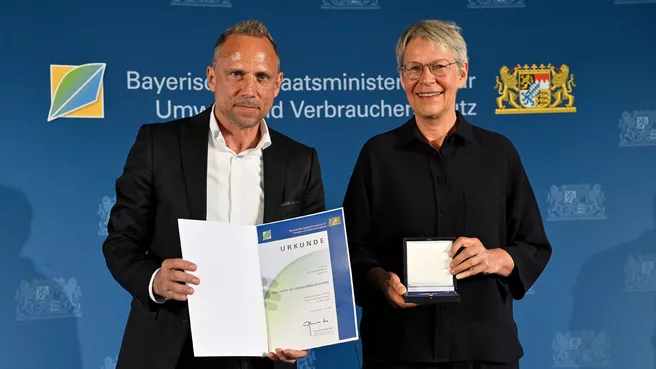Prof. Schön is head of the TUM Chair of Plant Breeding and spokesperson for the "BayKlimaFit 2" project network. She coordinates the project with her chair at the Technical University of Munich at the Weihenstephan site. The project network includes research groups from Freising, Munich, Erlangen and Regensburg. "Changing climatic conditions, limited biodiversity and plant diseases are challenges that we need to tackle now in the interests of food security. I am very pleased that our research network has delivered important results in this regard and that our findings can be incorporated into practical breeding," explains Prof. Dr. Chris-Carolin Schön, Head of the TUM Chair of Plant Breeding and spokesperson for the project network.
One of the world's leading agricultural scientists in plant breeding
During the event, Minister Glauber presented Prof. Schön with the Bavarian State Medal for outstanding services to the environment. "Professor Schön is one of the world's leading agricultural scientists in the field of plant breeding. Under her leadership, the nationwide large-scale research project Synbreed was established in 2009, making it the world's first interdisciplinary research network for genome-based breeding research in crops and livestock. The scientific work carried out is unrivalled internationally," emphasized Glauber. The State Medal for outstanding services to the environment is the highest award that the Free State of Bavaria can bestow for environmental commitment.
Climate-proofing agriculture in Bavaria
To mitigate the consequences of climate change in Bavaria, research and implementation of adaptation strategies for native crops are important. The Ministry of the Environment launched the BayKlimaFit project network series in 2016. This was extended in 2021. Bavaria's Environment Minister Thorsten Glauber presented the results of "BayKlimaFit 2 - Strong Plants in Climate Change" in Munich on 1 July 2024: “We can put the brakes on climate change. Bavaria is on the right track when it comes to climate protection and adaptation. The 'BayKlimaFit 2' project network is an outstanding example of this. The good news is that crops can be adapted to the consequences of climate change. This means that our farmers can continue to produce safe and healthy food from domestic production in the future.”
Over the past three years, the project network has focused on three main topics: "High-quality and climate-resilient plants", "Healthy plants in climate change" and "Efficient plant care despite climate stress". The scientists have identified drought stress-tolerant potato varieties, found a particularly drought and heat stress-tolerant malting barley variety and discovered so-called biologicals that can support the resistance of malting barley to fungal infections.
"BayKlimaFit 2" is a project consortium of 10 research projects and one project that is responsible for coordinating the project network. The Ministry of the Environment has funded the project network with 2.9 million euros.
